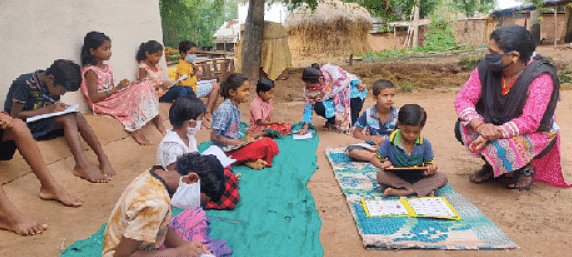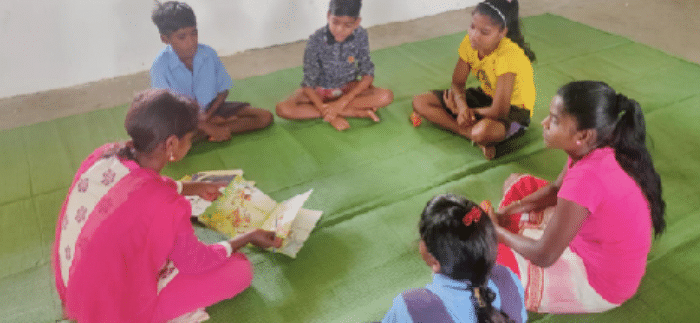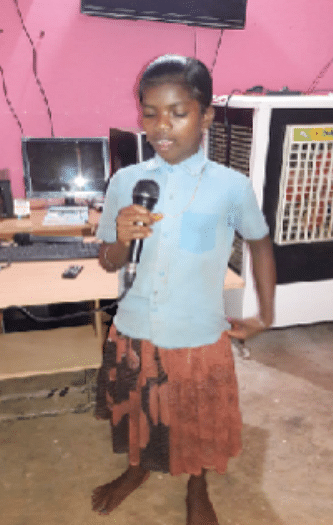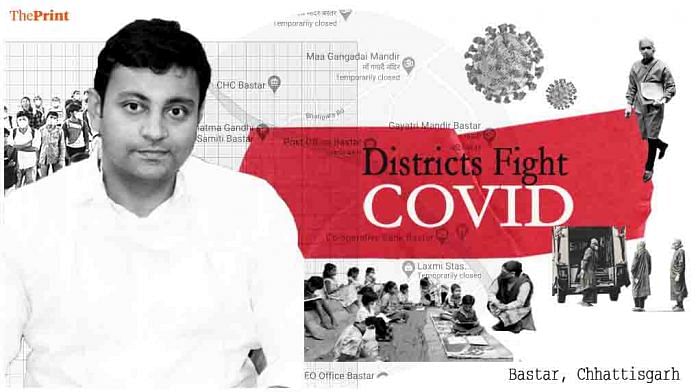When a pandemic of the scale of Covid-19 hits, children’s education takes a back seat. So, one of our first priorities was to make sure the children of Chhattisgarh’s Bastar, an aspirational district, don’t suffer during the lockdown and after.
During field visits, I noticed that the coronavirus crisis was having a psychological impact on children due to schools closing, and them not being able to meet friends or play. For the first three months, from March to May, the children enjoyed their extended summer holidays, but then they got impatient waiting for schools to reopen.
Bastar is largely a tribal area in Chhattisgarh. Online schooling is a struggle due to internet accessibility issues. A lot of tribal people do not even own mobile phones, let alone smartphones.
So, how did we take education and learning to children in a pandemic? This is the story of the ‘Seekh’ initiative.
Also read: Quarantine centres for pregnant women & universal PDS — Rajnandgaon’s Covid crisis offering
‘Seekh’
In the search for alternate ways to teach students, the Padhai Tuhar Dwar programme was started by the Chhattisgarh government under Chief Minister Bhupesh Baghel. It was an attempt to connect students with teachers through WhatsApp groups and educate them digitally. This was successful in most districts, but in Bastar connectivity was still a problem.
To solve this issue, the Bastar district administration in collaboration with UNICEF launched a volunteer-based community programme ‘Seekh’ under Padhai Tuhar Dwar, to take education to students through volunteers’ smartphones. We have 356 volunteers for 46 panchayats till now — which roughly equals to one volunteer for every 10 children.
These volunteers also help the parents and the community play a larger role by involving them in the learning process.
Volunteer selection was an important part of this programme, and was done at every school. Sarpanches, sachivs of panchayats, and School Management Committee (SMC) were consulted. The selected volunteers were trained online by UNICEF. These volunteers go to the homes of students and teach them individually.

Every alternate day, short videos are uploaded on subjects such as Hindi, maths and sports. These videos are intended to make learning fun and interesting through activities that can be done at home. One of the community volunteers in Dharaur village, Monika Ramkar, says, “I am enjoying teaching activity-based lessons and the students are also having fun learning. It becomes very easy for children to learn new things through them.” In one of the activities called ‘Kaho Kahani’, students were asked to write a fun short story based on a picture given to them.
We even implemented the programme in Lohandiguda, one of the most backward blocks. Lohandiguda has a severe shortage of teachers and the education department keeps looking for technological advancements to bridge this gap. The village had even introduced virtual assistants in classrooms earlier. In the Seekh programme too, Lohandiguda performed well.

Around 1 lakh students of 1,722 primary schools of Bastar will now be able to study through this programme. A primary school teacher, Chandrashekhar Kothari said, “Keeping the students connected to education is a difficult task in the current situation and a lot of effort has been put into online classes, but some of the students who don’t have a smartphone were left behind. We found a solution to this through the Seekh programme where we reached out to students and their parents with the help of Seekh mitras.”
In future, we are also going to rope in the Yuvoday group, which consists of young volunteers in Bastar who want to contribute to society.
Also read: Robots delivering meals to patients, low cost PPEs — West Singhbhum’s innovative Covid fight
Food, forest and fruits
The district administration of Bastar also made sure that no one is forced to sleep on an empty stomach once the lockdown was imposed. Grain banks were formed and rations distributed through the Public Distribution System (PDS) in every panchayat. Young children, pregnant women, lactating mothers and adolescent girls were given ready-to-eat packets by Anganwadi workers with the help of mitanins (ASHA workers). In urban areas, door-to-door delivery of fruits and vegetables through Bhumgadi, a Farmer Producer Organisation (FPO), which has been working in the district for last three years, and other NGO partners was done.
The lockdown period also coincided with the gathering season of forest produce such as tamarind, sal, tendu leaves, etc. Our Self-Help Groups (SHGs) helped in procuring these forest produce through Van Dhan centres. SHGs also made hundreds of masks to fill the market gap. Vegetable markets were rearranged to maintain social distance and sanitisers and masks distributed to vendors by the agriculture department.
The lockdown period was utilised to build health infrastructure and ready health workers for the challenging times ahead.
Also read: Ranchi’s Covid success story — helplines for stranded workers and one lakh meals a day
Amcho Bastar Radio
To reach out to every child and teach them English through their mother tongue Halbi, we started a community radio programme, called ‘Amcho Bastar Radio’, under the bigger umbrella of Padhai Tuhar Dwar. It has been started in Bhatpal panchayat of Bastar on a pilot basis. The sarpanch of Bhatpal, Rayo Kashyap, says, “The success of any programme can be measured by the demand it generates and there is a lot of demand from neighbouring villages to start this program there too.”
Content is developed by the district English-learning committee, which comprises a group of passionate English teachers. The content developed by these teachers is then converted to audio form by a team of Halbi (local language spoken by the majority Halba tribe of Bastar district) experts.
The content is then disseminated through various loudspeakers, which are positioned such that children can hear and study from their own homes without any need to come in contact with anyone else. The programme is conducted for one-and-a-half hours from 8 to 9:30 in the morning and from 5 to 6:30 in the evening every day. Now, every child of Bhatpal remains prepared with a notebook and a pencil before the broadcast begins. A parent, Bholaram Patel, says, “It is not only the children, but also the parents who are learning something new every day.”

Every slot also has a short story for children and clips on nutrition to generate awareness. Now, on any given morning, women waiting for their buckets to fill from a hand pump are also listening carefully to the bits related to health and wellness. One of the most heartwarming news is that of a vegetable seller from Bhatpal village who is now selling ‘potato’ and ‘onion’ instead of ‘aloo’ and ‘pyaaz’.
The current situation has brought out many innovative ways to reach out to the children, and this will go a long way in bridging the gaps in the education system, not just during the coronavirus pandemic, but also in a post-Covid world.
The author is the District Magistrate of Bastar, Chhattisgarh. Views are personal.
This article is part of the series ‘Districts Fight Covid’ that explores how India’s district magistrates and collectors have been fighting the coronavirus pandemic. Read all articles here.



